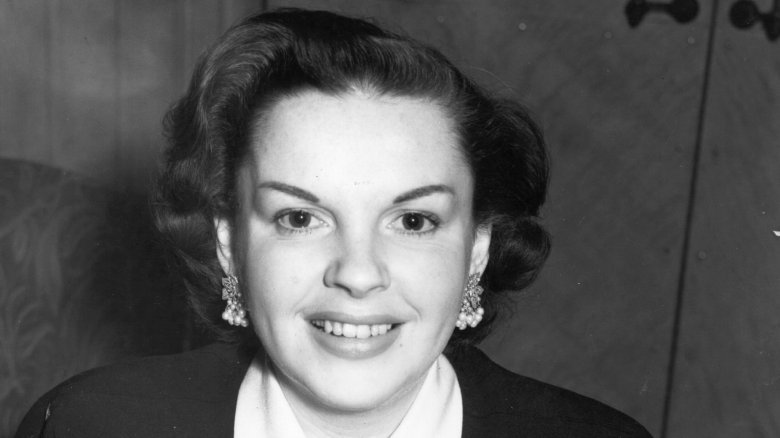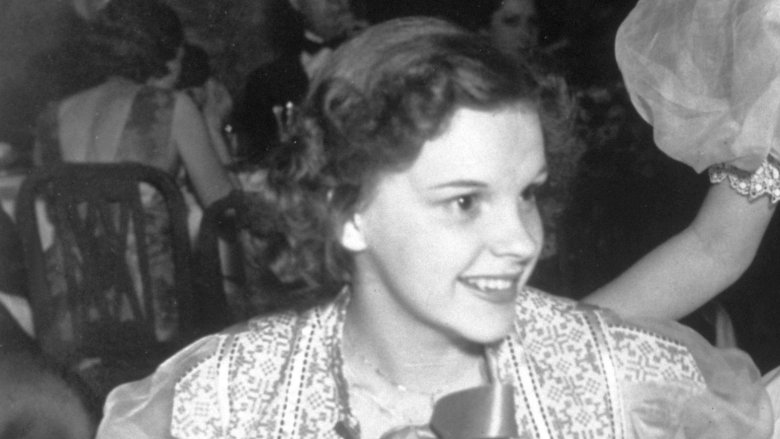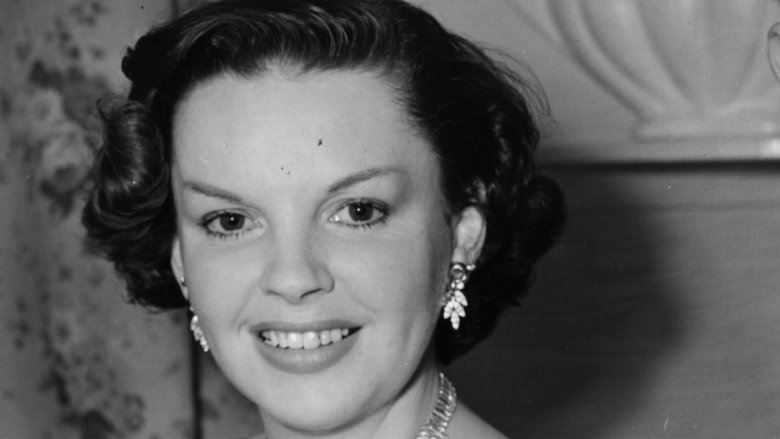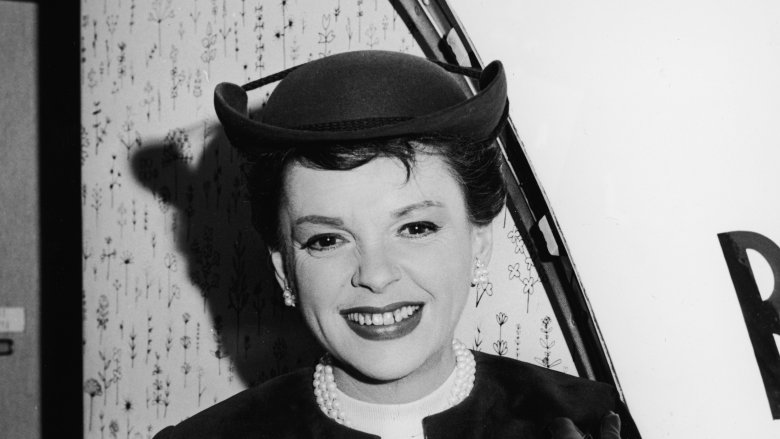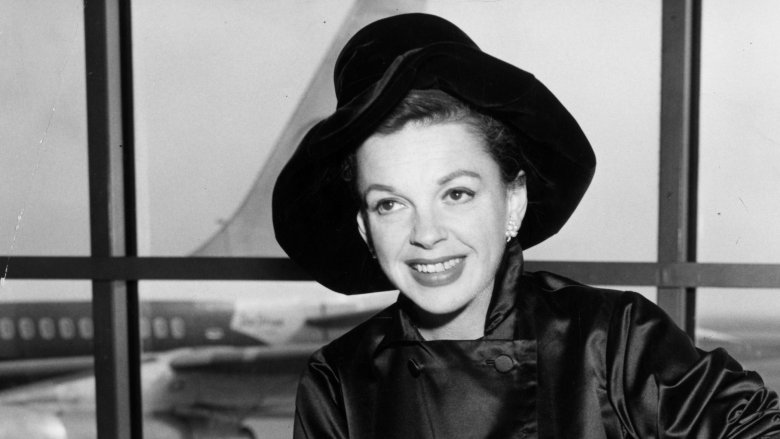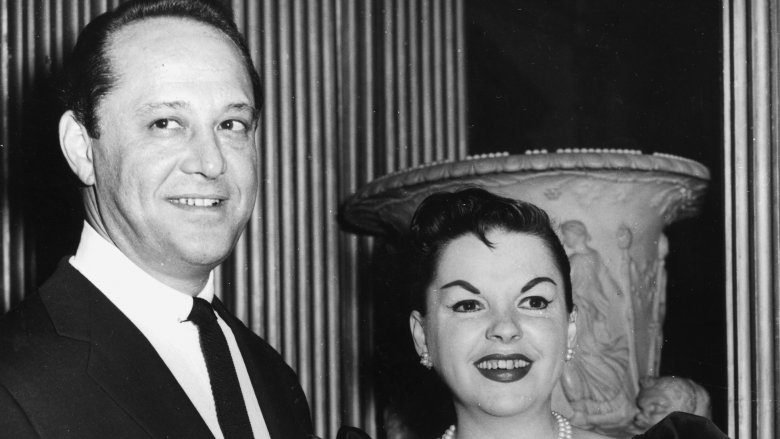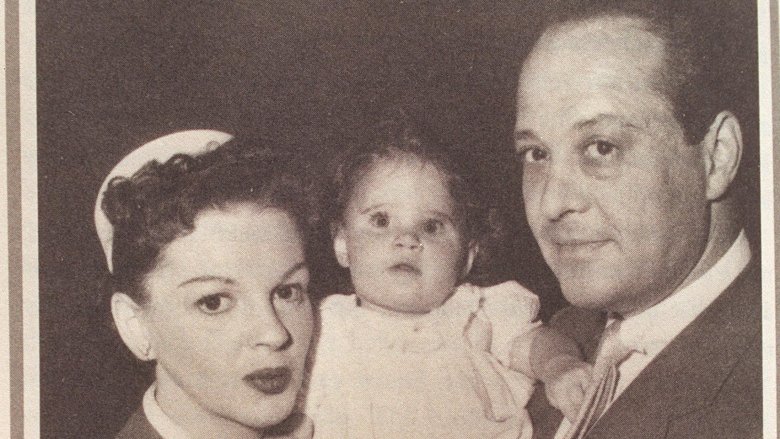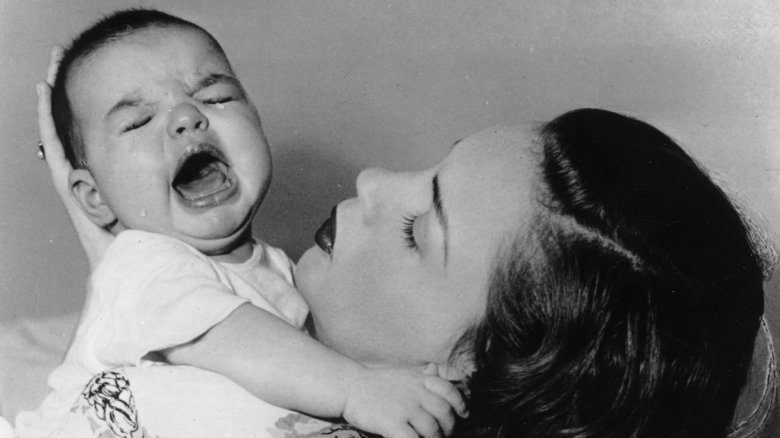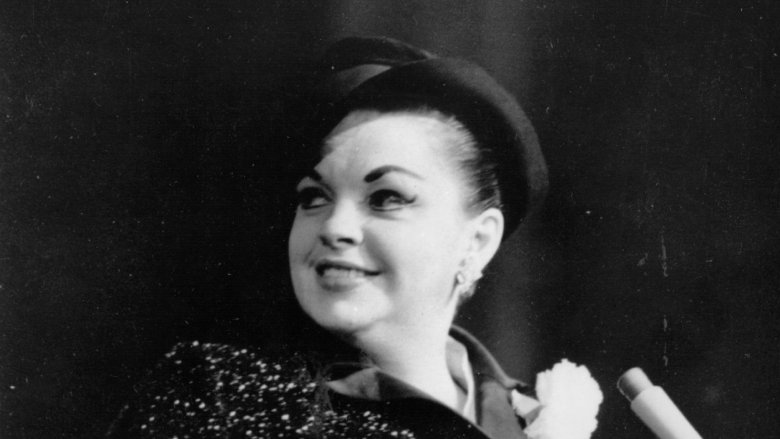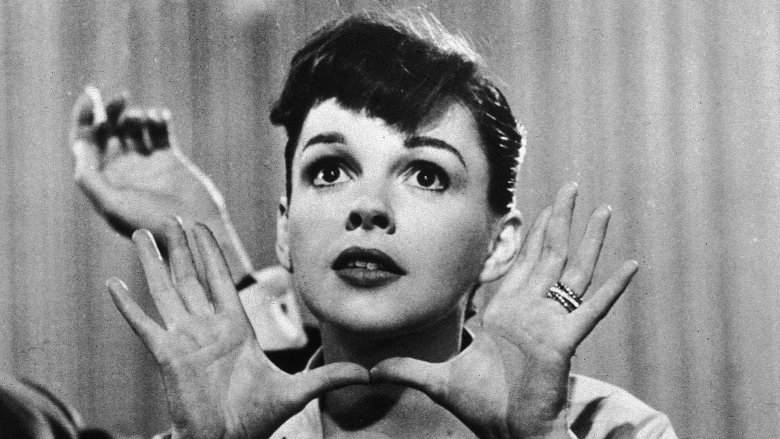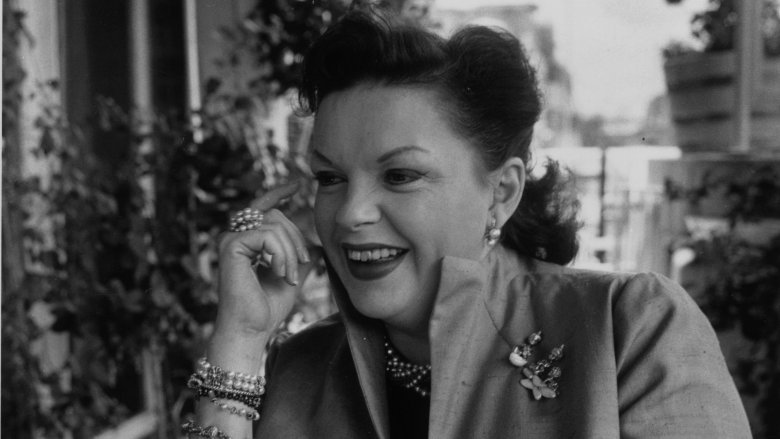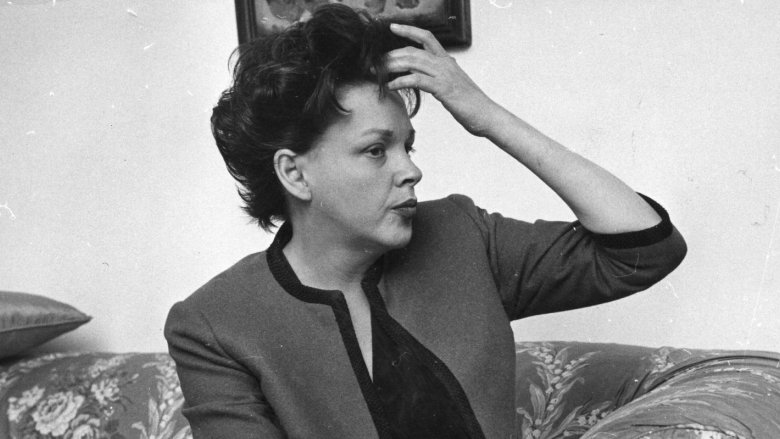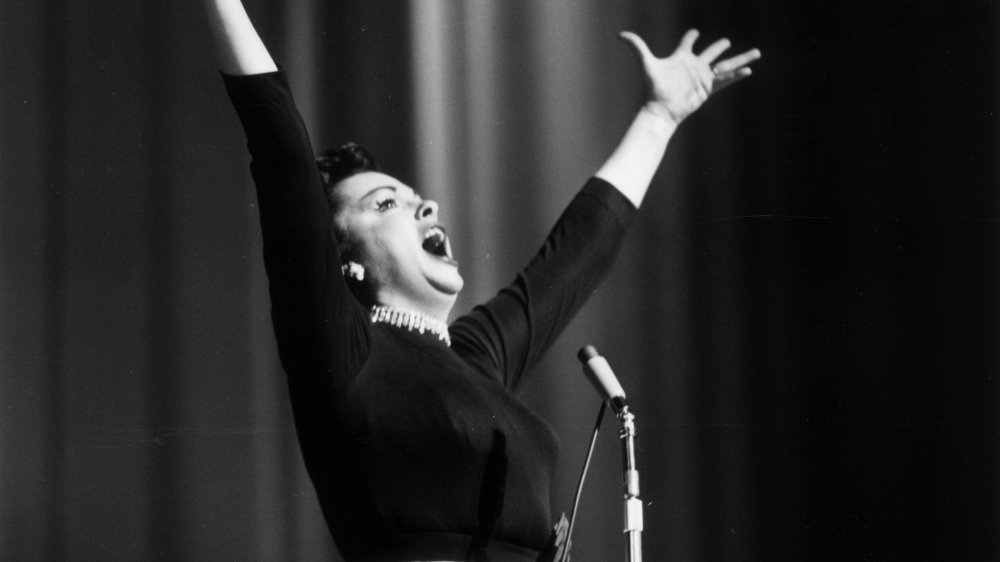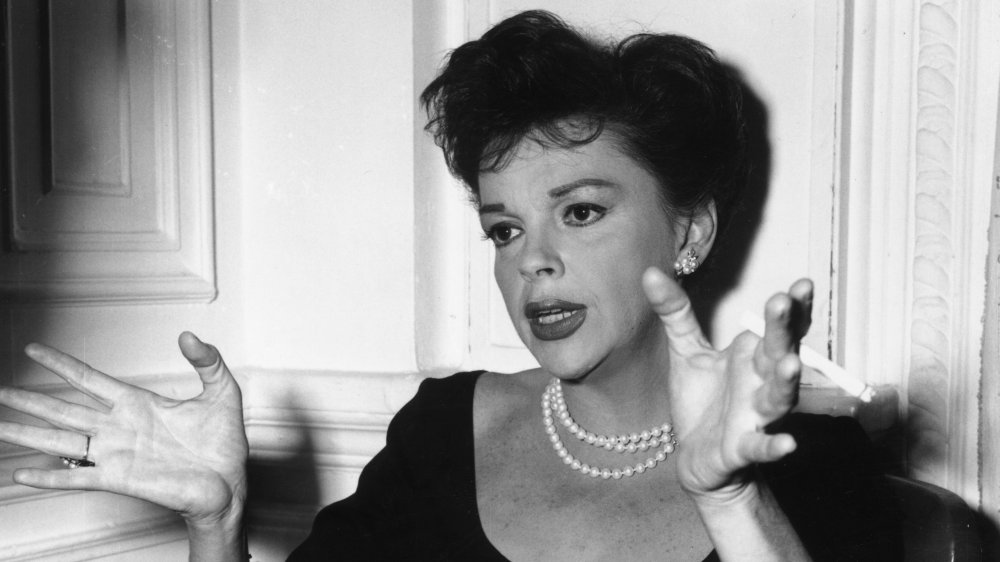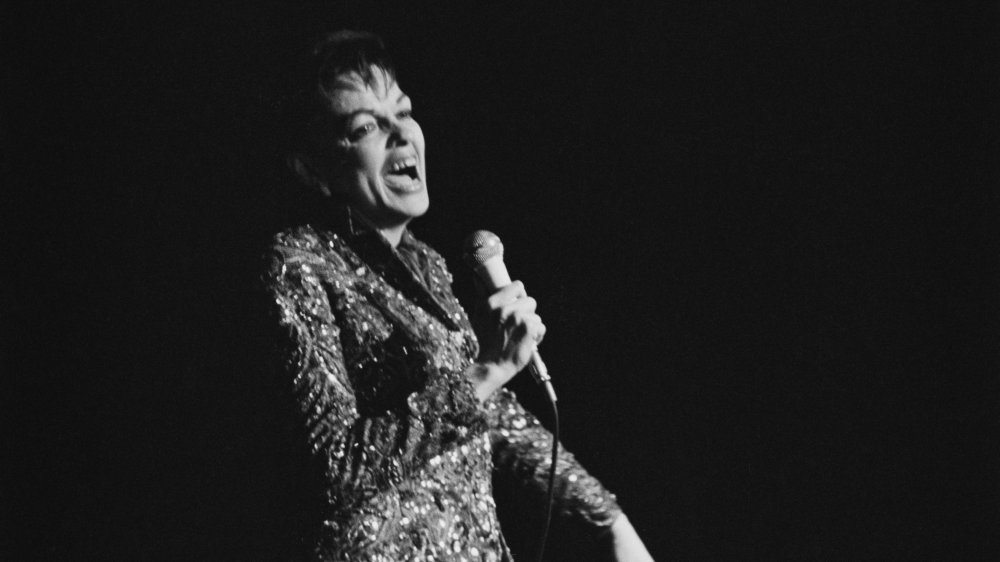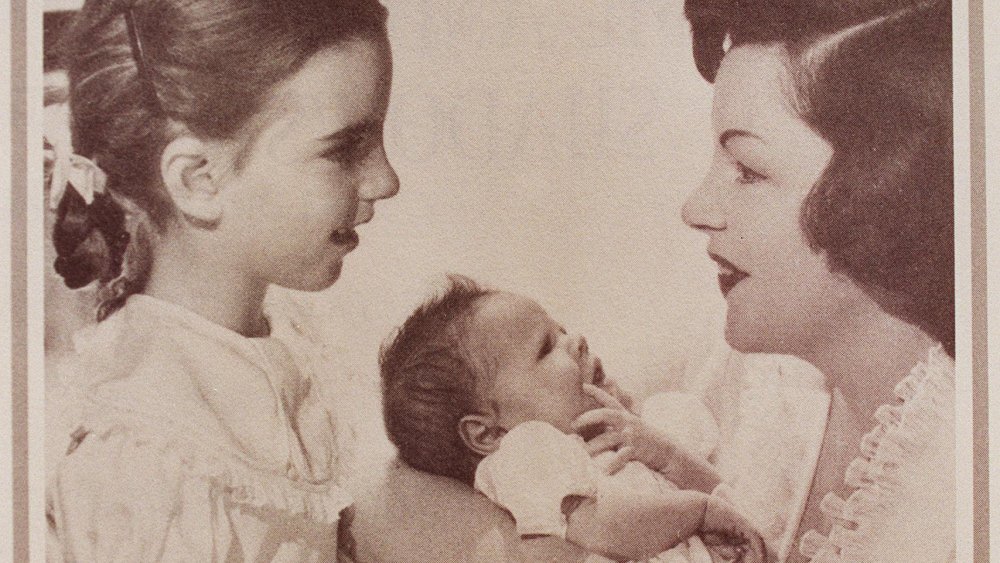The Tragic, Real-Life Story Of Judy Garland
Frances Ethel Gumm is not a widely recognized name, but under her stage name — Judy Garland — she became of the best-known film stars of all time. In addition to being a successful actress, Garland was an extraordinary singer and Grammy-award winner. Yet in spite of her phenomenal success, Garland's life was a tragic one, marked by drug abuse, suicidal tendencies, and failed marriages.
She began her career when she was just two and a half years old, performing with her older sisters, Susie and Jimmie. By the time she was 13, she had signed her first movie contract. By the time she was 20, she had several films to her credit and had won a special Academy Award for her role in The Wizard of Oz. But by 47, she was dead.
How did one of Hollywood's brightest stars dim so soon? Garland's life was full of pain and tragedy, but the most heartbreaking part is that much of it could have been avoided.
Judy Garland grew up with a pushy stage mom
Judy Garland's early success wasn't so much the result of a lucky break as it was the outcome of years of planning by her mother, Ethel Gumm. Gumm, a former vaudeville performer, pushed all of her daughters into show business, but she recognized early on that Garland had the most talent.
Garland began to tour the country as a soloist, with Gumm giving her daughter sleeping pills starting at the age of 10 to help her sleep while on the road. Garland reportedly called her mother "the real Wicked Witch of the West," a reference to the villain in one of her best known films, The Wizard of Oz.
Garland told Barbara Walters in a 1967 interview that her mother was a "mean" stage mother. "She was very jealous because she had absolutely no talent," she said. "She would stand in the wings... and if I didn't feel good... she'd say, 'You get out and sing or I'll wrap you around the bedpost and break you off short!' So I'd go out and sing."
Judy Garland was starved by her studio
At the age of 13, Judy Garland was signed to MGM after an audition with the film studio's co-founder Louis B. Mayer. Stunned by her beautiful singing voice, Mayer didn't require her to go through a screen test, and he signed her on the spot. It was the big break Garland and her mother had been working for, but, instead of her dreams coming true, Garland soon found herself living in a nightmare.
The studio treated her harshly. Concerned about her weight, the studio monitored Garland's eating. Food would often be taken away from her, leaving her in a constant state of hunger. She would remain insecure about her body image for the rest of her life. Yes, this marked just one of the horrific ways Old Hollywood studios abused actors.
Charles Waters, a director who worked with Garland, referred to Garland as "the ugly duckling" of the industry, according to The Independent. He claimed the way the studio treated her "had a damaging effect" on Garland. "I think it lasted forever really," he said.
The studio pushed Judy Garland to take drugs
Judy Garland was not just starved by MGM, but she also began a lifetime of drug dependency while at the studio. The studio would often push its stars to the limit, and Garland would sometimes find herself working 18 hour days, six days a week. To keep her going (and to keep her slim), the studio would give the teenager drugs, marking one of the most scandalous stories of Old Hollywood. She was given amphetamines to keep her energetic and sleeping pills to calm her down.
After Garland's death, film critic Roger Ebert wrote about Garland's performance in the 1954 musical A Star Is Born. According to Ebert, a woman who had worked on the production team said Judy was worked "incredibly hard." When the film fell behind on its shooting schedule, they put Garland, who had been clean when she began filming, back on drugs.
"They were going back to the same so-called solution of 10 or 15 years ago," said Ebert's source. "If Garland was in trouble, or you thought she might be, put her on pills. Speed her up, slow her down. Run her like a clock."
Judy Garland faced harassment in Hollywood
Gerald Clarke, author of Get Happy: The Life of Judy Garland, revealed in his biography of Judy Garland (via The Seattle Times) that the star was subjected to sexual harassment at the studio. From the time she was 16, Garland was repeatedly propositioned for sex.
"Don't think they all didn't try," said Garland in an unfinished memoir for Random House uncovered by Clarke as part of his research. Studio head Louis B. Mayer complimented her voice by placing his hand on her left breast under the guise of touching her heart, where he said she sang from. "I often thought I was lucky that I didn't sing with another part of my anatomy," said Garland, who eventually worked up the courage to put an end to it when she was 20. According to Garland's memoir, Mayer cried when she put a stop to it, claiming to love the young singer.
Garland claimed abuse at the hands of at least one other studio executive, whom she didn't name. When Garland rejected his advances, she said "he began screaming" and threatened to ruin her career, telling her, "I'll break you if it's the last thing I do."
Judy Garland was unlucky in love
Desperate for love, Judy Garland married five times. In 1941, at the age of 19, she married composer David Rose. Her mother and the studio tried to stop her, concerned about how marriage would affect Garland's image. Garland and Rose eloped in Las Vegas, but their marriage was short-lived. They divorced in 1944.
The following year, Garland married her second husband, director Vincente Minnelli. They had a daughter together, Liza, but this marriage was also short-lived. Minnelli and Garland divorced in 1951, a decision partially influenced by Minnelli's attraction to other men.
A year later, Garland married businessman Sid Luft, with whom she had two children, Joey and Lorna. They divorced in 1965. Garland claimed Luft was abusive and hit her, although Luft denied this. Garland said that her next husband, actor Mark Herron, also hit her, and the two separated after only a few months. Like Minnelli, Herron was also attracted to men, and would later enter a long-term relationship with a fellow actor.
Garland had been married to her fifth husband, Mickey Deans, for just three months when Deans found her dead in their bathroom. Deans remained loyal to Garland's memory and never remarried.
Judy Garland was forced to get an abortion
Judy Garland had three children in her life, but she didn't have this family until later in her career. Her first pregnancy, according to Vanity Fair, ended in abortion when she was just 19 and married to her first husband. Abortion was still illegal then, but Garland's mother and her studio, MGM, arranged to have the procedure quietly done.
Such abortions were common in Hollywood at the time, as movie studios didn't want to ruin the image of their stars as sex symbols or, as in the case of Garland, child stars. Many of Garland's contemporaries, including Bette Davis and Ava Gardner, also had abortions in order to save their acting careers.
Years later, Garland's boyfriend Sid Luft urged her to get an abortion when she became pregnant in 1951. Though they later married, at the time Garland became pregnant they were married to other people. Luft was only thinking of her career, but later regretted his decision. He acknowledged in his autobiography, Judy and I (via The New Yorker), "I was as unjustified as I was insensitive."
Motherhood was hard for Judy Garland
Perhaps because she herself did not have a strong mother figure, Judy Garland had somewhat troubled relationships with her children. Her son, Joey Luft, told Closer that Garland was a loving mother, but that her battle with drug addiction caused her to behave erratically. "There were times when my mom wasn't acting right, so I'd ask my dad, 'Is she sick?' and he explained it all to me," said Luft.
His sister Liza Minelli said that their mother experienced mood swings and that her children would often be affected by them. "If she was happy, she wasn't just happy," said Minelli. "She was ecstatic. And when she was sad, she was sadder than anyone." According to Minelli, Garland would veer from "excessive love bouts" to screaming at her children.
Daughter Lorna Luft said that Garland was "damaged," in addition to being "funny and sweet." She shared, "There wasn't enough love in the world, enough attention in the world, to save my mother," continuing, "No one could have saved her but herself."
Judy Garland's long history of instability
Judy Garland's traumatic childhood, combined with her dependency on drugs, caused a great deal of turmoil in her adult life. Her ex-husband Sid Luft painted a picture of Garland's emotional instability in his book, Judy and I. According to Luft's memoir (via The New Yorker), Garland would take stimulants and diet pills in an effort to remain "camera slim," an obsession carried over from the days the studio would take away food from the adolescent star.
Luft claimed it wasn't just Garland's unhealthy self image that kept her on the pills, but that this was also an excuse to keep taking the drugs. "She confessed it was virtually impossible for her to sustain a work mode in front of the cameras without taking some kind of medication," he wrote.
Garland also suffered from postpartum depression, for which she was given more medication on top of the drugs with which she was already self-medicating. Luft thought he could help his wife manage her addiction, something that is often widely misunderstood. "I wasn't thinking of Judy as a clinically ill person," he said. "I was worried something awful had happened to the delightful, brilliant woman I loved."
Judy Garland's multiple attempts to take her own life
Judy Garland's self-destructive behavior didn't stop at drug abuse. After being fired from MGM in 1950, the singer tried to take her own life twice. At the time, she was married to her second husband, Vincente Minnelli, and her depression contributed to the stress that led to their divorce.
Not long after, then married to Sid Luft, Garland cut her throat and was found by him in the bathroom. "What demons inhabited her soul just when life seemed so rich and productive?" wrote Luft in Judy and I (via People). "It was a gigantic puzzlement that she would poison herself with pills, and that the toxic reaction to whatever she swallowed would create an impulse for self-mutilation."
Luft noted his wife's erratic behavior after another attempt. Garland presented her slashed wrists to her husband, saying, "Look, darling, what I've done!" while she was "bleeding profusely." According to an obituary in the Los Angeles Times, Luft said that Garland tried to kill herself 20 times throughout the course of their 13-year marriage.
"My life isn't tragic at all," Judy Garland once said
In spite of media coverage to the contrary, Judy Garland insisted that she was happy — at least in 1960. In an interview with Herbert Kretzmer, quoted in the book Judy Garland on Judy Garland: Interviews and Encounters (via Parade), Garland expressed her frustration that she was viewed "as a neurotic kid, full of fits and depressions."
"Why do people insist on seeing an aura of tragedy around me always?" she asked. "My life isn't tragic at all. I laugh a lot these days. At myself, too. Lord, if I couldn't laugh at myself I don't think I'd be alive."
By 1967, Garland's optimism was waning. She admitted in McCall's (via Parade) that her life had been a hard one. "Do you know how difficult it is to be Judy Garland?" she asked the magazine. "And for me to live with me? I've had to do it — and what more unkind life can you think of than the one I've lived?"
Judy Garland's untimely death
Towards the end of her career, Judy Garland's fame and money were both dwindling. Her daughter Lorna Luft wrote in Me and My Shadows: A Family Memoir (via Star Tribune) that by the mid-1960s, her mother was "homeless broke." She was singing in bars for just $100 a night. Her older daughter, Liza Minnelli, was beginning to experience success in her career at this time and helped financially support Garland.
At the time of her death from an accidental overdose of barbiturates, Garland had a career that consisted of sporadic performances. While it would be easy to believe that, disappointed with her failing career, she had finally succeeded in taking her own life, Garland appeared to be happier than she had in a long time.
Friends claimed that she had seemed to be in a good mood the night before she was found dead. She had also recently married Mickey Deans, her fifth husband. According to the Los Angeles Times, Garland was thrilled with the marriage. At last, the star had everything she ever wanted, telling the press, "Finally, finally, I am loved."
Judy Garland spent most of her life under psychiatric treatment
According to The SAGE Encyclopedia of Intellectual and Developmental Disorders, Judy Garland may have suffered from bipolar disorder. The actress also suffered nervous breakdowns. Her daughter Lorna Luft wrote in her memoir, Me and My Shadows, that there was a family history of suicide. One of Garland's aunts took her own life, and her oldest sister died from an overdose of barbiturates.
According to her obituary in The New York Times, Garland was under psychiatric care from the age of 18. None of the treatments Garland underwent, including electroshock therapy and psychoanalysis, seemed to help her much. "She'd make up the most terrific stories for [the doctors]," her daughter Liza Minelli told 60 Minutes. "And she would do it in the car, going over there. She'd say, 'Now, what's a good dream? What can I say I dreamt?' And I'd say, 'Well, don't you think maybe you should tell him what you really dreamt, isn't that why you're going, so he can help you?' And she said, 'But he always looks so bored. I mean, I can't stand it if he's bored."
Judy Garland had a reputation of being difficult to work with
Judy Garland had a reputation as not only one of Hollywood's greatest actresses, but also as one of the hardest to work with. Her obituary in The New York Times described her as "temperamental" and too risky to hire later in her career. Her reputation was presumably in no small part due to her mental health problems and her battles with substance abuse. According to PBS, Garland was fired from the MGM film Annie Get Your Gun in 1949 for tardiness, drunkenness, being overweight, and "instability." While MGM gave her other opportunities, she was eventually fired from the studio due to "tardiness and absenteeism" while filming Royal Wedding soon after.
While the decline of Garland's film career because of her mental health and substance abuse problems might seem tragic, her persistence is a mark of her fighting spirit. "Perhaps the most remarkable thing about the career of Judy Garland was that she was able to continue as long as she did — long after her voice had failed and long after her physical reserves had been spent in various illnesses that might have left a less tenacious woman an invalid," wrote The New York Times in her obituary.
Judy Garland attempted an ill-fated comeback attempt shortly before her death
Judy Garland never stopped trying to revive her career. In December 1968, just months before she died, Garland began a five-week run in London's Talk of the Town. While the shows sold out, the critics were far from kind. Tony Palmer of the Observer painted a harsh portrait of Garland's final months in a review of one of those performances (via The Guardian). "It is all immaculate and meaningless," wrote Palmer. "The shoddy, tarnished world that created her has emasculated her. In her we see the broken remnant of a gaudy age of show-biz which believed that glamour was a good enough substitute for genius."
In Garland's obituary, Time called the comeback "the biggest flop of her life," saying that the star looked like a "walking casualty."
The heartbreak from her ill-fated comeback may have contributed to the further deterioration of Garland's mental health. According to her daughter Liza Minelli, the world wore her mother down. "She let her guard down," she told Time in 1972. "She didn't die from an overdose. I think she just got tired."
Judy Garland's children inherited a troubled legacy
Perhaps even more heartbreaking than Judy Garland's troubled life and tragic death is that the cycle of substance abuse did not end with her. Her daughters, Lorna Luft and Liza Minelli, faced many of the same struggles as their mother. In 2015, Minelli entered rehab — and not for the first time. "Liza Minnelli has valiantly battled substance abuse over the years and whenever she has needed to seek treatment she has done so," her representative told E! News.
Minelli had previously entered at least two other rehab facilities and attended Alcoholics Anonymous meetings. "My whole life, this disease has been rampant," she told The Guardian. "I inherited it, and it's been horrendous, but I have always asked for help."
Luft also did "cocaine" and "all sorts of things," but didn't think of it as a problem even when someone pointed out she was following in her mother's footsteps. "I said, 'Oh, no, no, no ... she had a problem," she told Studio 10. "I only do [drugs] at night.' Stupid." She continued, "That's what [I really] thought that was for real until I went to the Betty Ford Rehabilitation Clinic and I got help."
